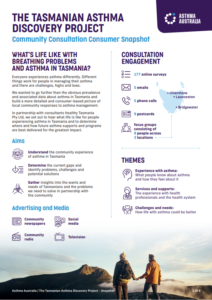A recent Asthma Australia survey revealed that nearly 60 per cent of respondents with asthma cannot do regular activities like sport or go out because of their condition but accept this a normal part of a life with asthma.

The survey was part of the Tasmanian Asthma Discovery Project, which is establishing what life is like for people with asthma in Tasmania. The Project is being conducted with consultants Healthy Tasmania and is supported by funding from Primary Health Tasmania (Tasmania PHN) through the Australian Government’s Primary Health Networks Program.
The survey indicates that while many respondents felt unable to participate actively in life, the majority still felt confident in their asthma management and medication use. This points to Tasmanians with asthma not being aware that good asthma management could in fact help them live more free and active lives.
Around 78 per cent said they felt they understand how asthma medication works to control asthma, 81 per cent said their asthma is usually manageable, 84 per cent said they know what to do when they are having trouble breathing and 93 per cent said they know how to use asthma devices like puffers correctly.
However, 51 per cent of respondents said their health, or the health of the person they care for, is impacted by asthma, 48 per cent were worried that their health might get worse and 45 per cent were worried about future asthma attacks.
CEO of Asthma Australia Michele Goldman said, “There is clearly a disconnection between people’s perception of successful asthma management and true positive health outcomes in their daily life.
“People are doing less of the things that they want to do, are conscious of having poor respiratory health and for many, their next asthma attack is top of mind. At the same time, people feel that they are managing fine and this is a normal part of having asthma, so they just live with it.
“We want to change this so that people can live full and active lives because they are managing their asthma well.”
The survey involved 177 participants from across Tasmania and included people with asthma and their carers.
Results revealed that respondents most value face-to-face support in their community from people with a lived experience of asthma. They also highly value GPs as a source of advice but face challenges with getting appointments and affording GP fees.
“This survey highlights the important role Asthma Australia can play in directly supporting people with asthma in Tasmania. We want people with asthma to know that our aim is to support Tasmanians with asthma throughout their asthma journey. A further goal for Asthma Australia is to support their GP and other local organisations connected to the health system that are important to people with asthma.
“Asthma Australia intends to keep finding out what matters to Tasmanians when it comes to good asthma care and continue to build local programs to deliver this, through both direct and collaborative action,” Goldman said.
“There is an opportunity for the Tasmanian Government to invest further in respiratory health through greater focus on consumer action and empowerment. This would help people with asthma in Tasmania to avoid unnecessary hospital visits, staying healthy and leading active and productive lives,” she said.
Primary Health Tasmania spokesperson Susan Powell said health programs and services have the best chance of success when they’re developed in response to known evidence, needs and priorities. “This project has gathered important information to help shape asthma support in Tasmania into the future,” Ms Powell said.
“Part of Primary Health Tasmania’s role is supporting primary healthcare professionals to provide the best possible care to Tasmanians, and we’ll be looking at how we can support organisations like Asthma Australia to connect GPs and other health professionals with the information, resources and training they need.”
The Tasmanian Asthma Discovery Project was developed from learnings and ideas explored in Asthma Australia’s work in South Australia, which is funded by the Country SA Primary Health Network.





 1800 278 462
1800 278 462


